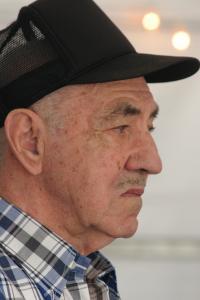Arnold "Woody" Bowers

The Working Waterfront Festival Community Documentation Project
This project documents the history and culture of the commercial fishing industry and other port trades. The project began in 2004 in conjunction with the Working Waterfront Festival, an annual, educational celebration of commercial fishing culture which takes place in New Bedford, MA. Interviewees have included a wide range of individuals connected to the commercial fishing industry and/or other aspects of the port through work or familial ties. While the majority of interviewees are from the port of New Bedford, the project has also documented numerous individuals from other ports around the country. Folklorist and Festival Director Laura Orleans and Community Scholar and Associate Director Kirsten Bendiksen are project leaders. The original recordings reside at the National Council for the Traditional Arts in Maryland with listening copies housed at the Festival's New Bedford office.
Millie Rahn
Erin Heacock
On September 25, 2004 Millie Rahn interviewed Woody Bowers, who was joined by his daughter and son-in-law, Sue & Rodney Murray, as part of the Working Waterfront Festival Documentation Project. Woody discusses his life as a commercial fisherman in New Bedford, Massachusetts, and his experiences in the Merchant Marines during World War II. Sue Murray, Woody’s daughter, shares what it was like growing up with a father who was often out at sea. Rodey Murray, Sue’s husband, serves as a captain of a scallop boat. While none of his children have followed in his footsteps, he believes strongly that there is a future in the fishing industry. Woody and Rodney chronicle their families’ history of fishing and their experiences as fishermen. Woody recounts his journey from Nova Scotia to New Bedford, Massachusetts, and the challenges faced by immigrants. Woody also talks about the boats he worked on, including one that sank after thieves stole all the alcohol and dismantled the vessel. Rodey gives more detail about his experiences as a captain of a scallop boat and the changes he’s noticed. While differences, such as better pay, are an improvement, there are also more regulations that make it harder for boat owners to make a living. Rodey stresses the importance of conservation, but also highlights the need to strike a balance between conservation and the economic interests of fishermen. The conversation ends with a discussion of the importance of preserving fishing traditions and the memories of those who have worked in the industry for generations.
Please Note: The oral histories in this collection are protected by copyright and have been created for educational, research and personal use as described by the Fair Use Doctrine in the U.S. Copyright law. Please reach out Voices@noaa.gov to let us know how these interviews are being used in your research, project, exhibit, etc. The Voices staff can help provide other useful resources related to your inquiry.
The NOAA mission is to understand and predict changes in climate, weather, oceans, and coasts, to share that knowledge and information with others, and to conserve and manage coastal and marine ecosystems and resources. The Voices Oral History Archives offers public access to a wide range of accounts, including historical materials that are products of their particular times, and may contain offensive language or negative stereotypes.
Voices Oral History Archives does not verify the accuracy of materials submitted to us. The opinions expressed in the interviews are those of the interviewee only. The interviews here have been made available to the public only after the interviewer has confirmed that they have obtained consent.
